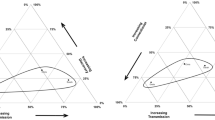Abstract
This article reports on a self-directed, school-based, practice-based professional development (PD) experience aimed at helping elementary school teachers to develop knowledge and expertise in inquiry-based teaching of mathematics. It discusses the characteristics of the self-directed orientation of this PD that supported the teachers’ learning, the nature of the inquiry-based knowledge they constructed, and the impact on their teaching. It highlights the centrality of agency, practical knowledge, and situated learning in this PD approach. The findings suggest that this approach can help mathematics teachers who want to be the architect of their own learning to transform their classrooms in meaningful and desirable ways.

Similar content being viewed by others
References
Alberta Commission on Learning. (2003). Every child learns. Every child succeeds. Edmonton, AB: Alberta Learning Publication.
Brown, J. S., Collins, A., & Duguid, S. (1989). Situated cognition and the culture of learning. Educational Researcher, 18(1), 32–42.
Bruner, J. (1996). The culture of education. Cambridge, Massachusetts: Harvard University Press.
Burns, M. (1988). Mathematics with manipulatives. New Rochelle, NY: Cuisenaire Company of America Inc.
Carter, K. (1990). Teachers’ knowledge and learning to teach. In W. R. Houston, M. Haberman, & J. P. Silkula (Eds.), Handbook of research on teacher education (pp. 291–310). New York: Macmillan.
Dewey, J. (1905). How we think. Mineola, NY: Dover Publishers.
Elbaz, F. (1983). Teacher thinking: A study of practical knowledge. London: Croom Helm.
Even, R., & Ball, D. L. (Eds.). (2009). The Professional education and development of teachers of mathematics: The 15th ICMI Study. New York: Springer.
Fenstermacher, G. D. (1994). The knower and the known: the nature of knowledge in research on teaching. Review of Research in Education, 20, 3–56.
Francisco, J. M., & Maher, C. A. (2011). Teachers attending to students’ mathematical reasoning: Lessons from an after-school research program. Journal of Mathematics Teacher Education, 14, 49–66.
Kazemi, E., & Franke, M. L. (2004). Teacher learning in mathematics: Using student work to promote collective inquiry. Journal of Mathematics Teacher Education, 7, 203–235.
Koellner-Clark, K., & Borko, H. (2004). Establishing a professional learning community among middle school mathematics teachers. In Proceedings of the 28th Conference of PME (Vol. 2, pp. 223–230).
Krainer, K., & Wood, T. (Eds.). (2008). The international handbook of mathematics teacher education: Individuals, teams, communities and networks. Rotterdam: Sense publishers.
Lave, J., & Wenger, E. (1991). Situated learning: Legitimate peripheral participation. Cambridge, UK: Cambridge University Press.
Males, L. M., Otten, S., & Herbel-Eisenmann, B. A. (2010). Challenges of critical colleagueship: Examining and reflecting on mathematics teacher study group interactions. Journal of Mathematics Teacher Education, 13, 459–471.
National Council of Teachers of Mathematics. (1989). Curriculum and evaluation standards for school mathematics. Reston, VA: National Council of Teachers of Mathematics.
National Council of Teachers of Mathematics. (1991). Professional standards for teaching mathematics. Reston, VA: National Council of Teachers of Mathematics.
National Council of Teachers of Mathematics. (2000). Principles and standards for school mathematics. Reston, VA: National Council of Teachers of Mathematics.
National Research Council. (2000). Inquiry and the National Science Education Standards: A guide for teaching and learning. Washington, DC: National Academy Press.
Nickerson, S. D., & Moriarty, G. (2005). Professional communities in the context of teachers’ professional lives: a case of mathematics specialists. Journal of Mathematics Teacher Education, 8, 113–140.
Schön, D. A. (1987). Educating the reflective practitioner. Oxford: Jossey-Bass.
Stake, R. E. (1995). The art of case study research. Thousand Oaks, CA: SAGE.
Tirosh, D., & Wood, T. (Eds.). (2008). International handbook of mathematics teacher education: Vol. 2: Tools and processes in mathematics teacher education. Rotterdam: Sense Publishers.
Van de Walle, J. A. (2005). Elementary and middle school mathematics: Teaching developmentally. Toronto: Pearson Education.
van Es, E. A., & Sherin, M. G. (2010). The influence of video clubs on teachers’ thinking and practice. Journal of Mathematics Teacher Education, 13, 155–176.
Wells, G. (1999). Dialogic inquiry: Toward a sociocultural practice and theory of education. Cambridge: Cambridge University Press.
Author information
Authors and Affiliations
Corresponding author
Rights and permissions
About this article
Cite this article
Chapman, O. Elementary school teachers’ growth in inquiry-based teaching of mathematics. ZDM Mathematics Education 43, 951–963 (2011). https://doi.org/10.1007/s11858-011-0360-3
Accepted:
Published:
Issue Date:
DOI: https://doi.org/10.1007/s11858-011-0360-3




